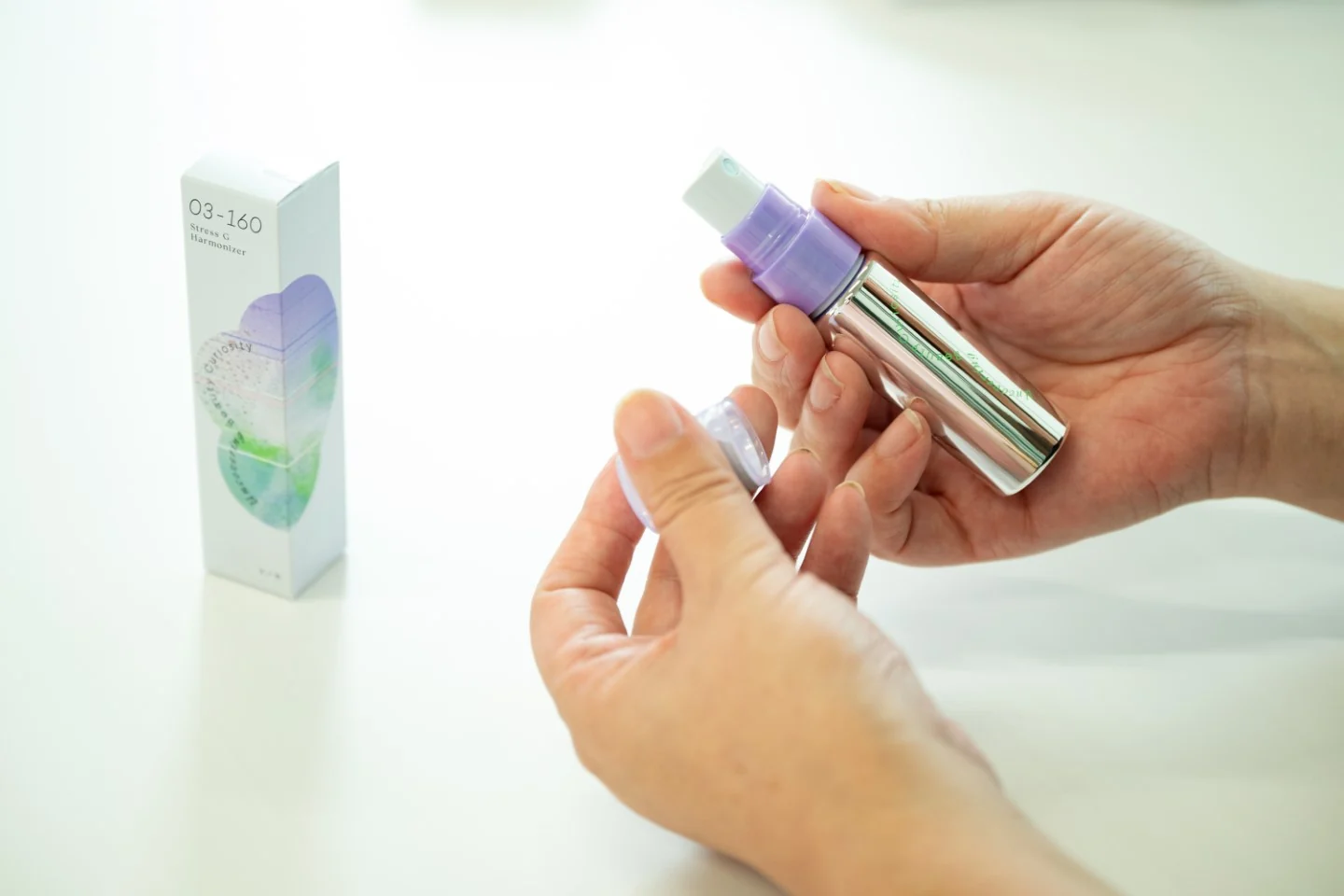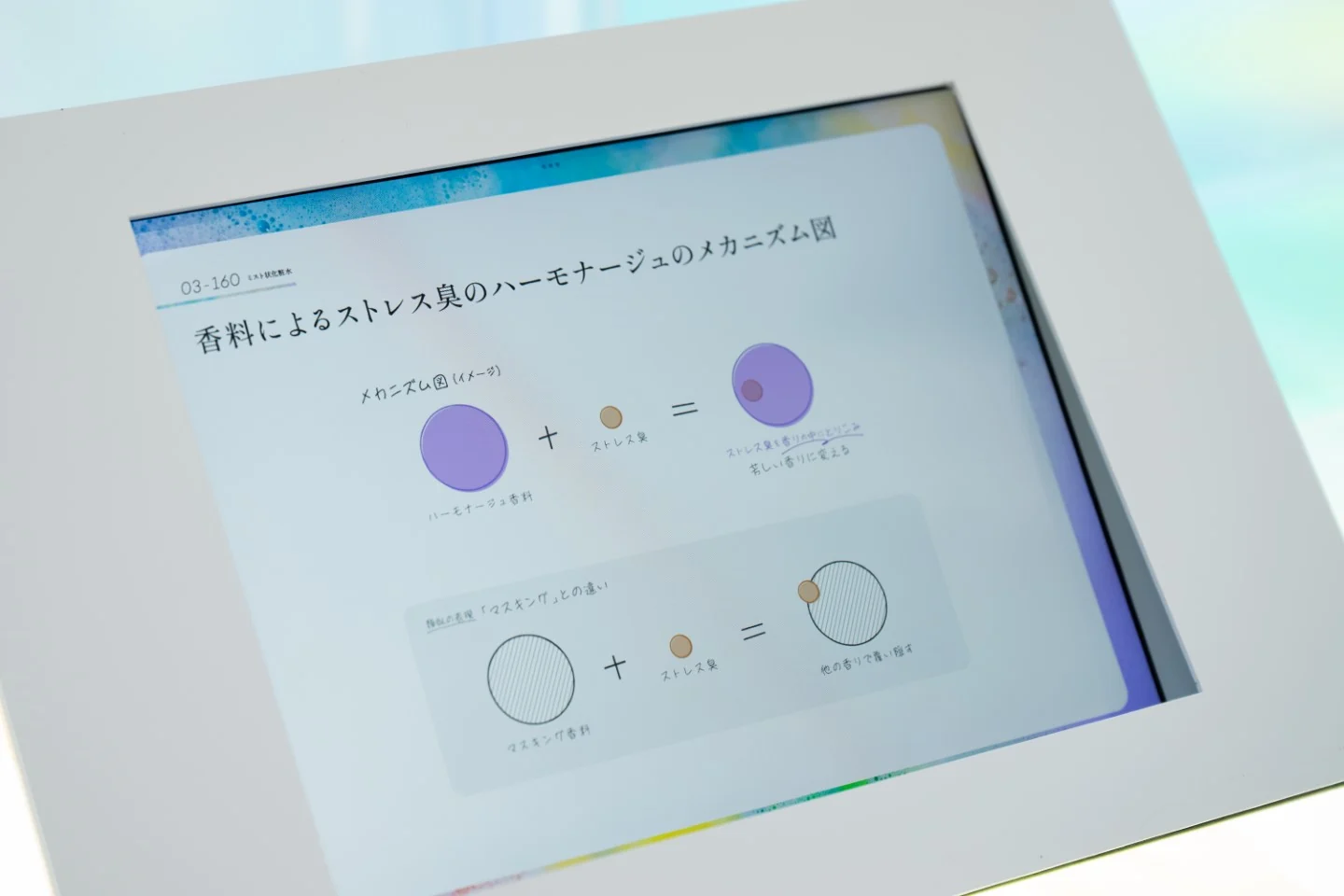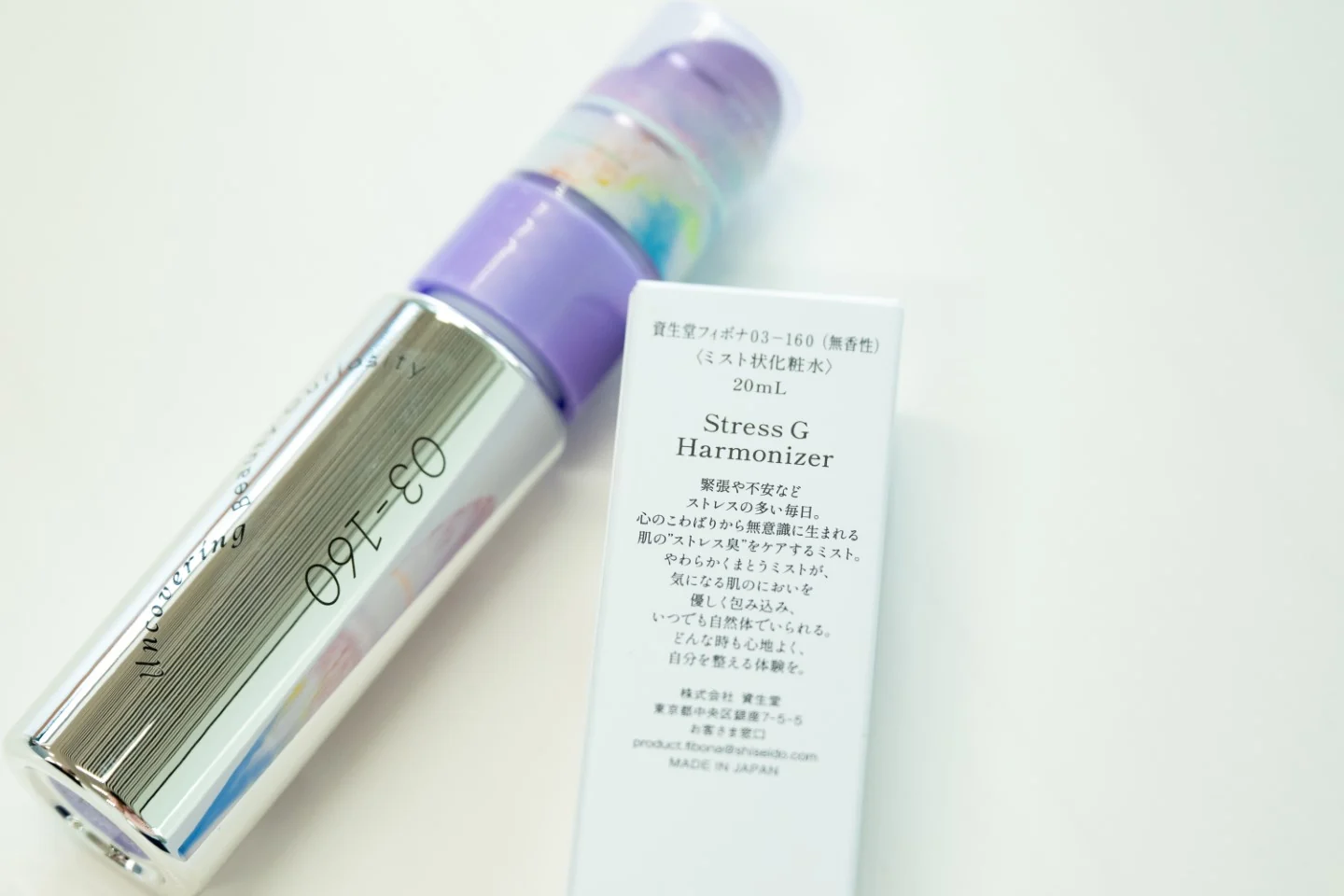fibona Lab
Taking care of "Stress Odor" Emitted from the Skin: The Story Behind the Creation of "Stress G Harmonizer"
2025.08.29

As a beauty product developed by Shiseido’s open innovation program “fibona,” the mist “Stress G Harmonizer” (product name: Shiseido Fibona 03-160) has been newly launched to care for “stress odor” emitted from the entire body due to stress from tension.
What is “stress odor” as revealed by Shiseido’s skin gas research? How does the “Harmonage Fragrance” enable care through the harmony of scents, and what is the new way of self-maintenance that “turns tension into an ally?”
We spoke with three project members: Masako Katsuyama, a researcher of “stress odor,” Daiki Fujimaki, who was in charge of product information design and communication, and Senko Negishi, who designed the usage method.
“Emotional Fluctuations” Become Your Own Scent
— What were your roles in this product development?
Fujimaki:
I was responsible for developing the information to convey the appeal of the product “Stress G Harmonizer” and how to communicate it to customers.

Katsuyama:
I was involved in research on the relationship between odors emitted from the skin, such as “skin gas” and “stress odor,” and the human body and mind, which formed the background of the product concept.
Negishi:
I designed the usage aspects of how customers can use it in their daily lives.

— What are the “skin gas” and “stress odor” that Katsuyama-san is researching?
Katsuyama:
Humans emit various gaseous components from the skin all over their bodies, which we call “skin gas.” Some of these, which have odors, are recognized as body odor, but odorless ones are also emitted.
Through this “skin gas” research, we newly discovered “stress odor.” When experiencing stress from tension, a specific odor is released from the skin. “Stress G Harmonizer” is an item that helps take care of this “stress odor.”

— How was “stress odor” discovered?
Katsuyama:
At Shiseido Research Institute, we have been conducting research on “skin gas” as an extension of fragrance research for many years. Since around 2005, I have been focusing on the minute gases naturally emitted from the skin while researching the effects of diet and physical condition on the skin. I felt it could become a tool to capture internal body changes without the pain of blood tests.
Initially, I was researching changes in body odor due to food and physical condition, but at some point, I realized that “emotional states” might also change the odor.
The trigger for this realization was completely accidental. At that time, when we collected “skin gas” from general participants in our research as usual, we detected an unusual “fried onion (like the one on ramen)” smell from the palms of several people. To find the cause, we asked them about their recent meals and whether they were feeling unwell, but ultimately, we found that they were nervous about me in a lab coat.
To confirm whether stress from tension was really the cause, we conducted comparative tests between tense and relaxed states. We found that this odor always appeared in a tense state, confirming that the change in odor was due to emotions. Next, we began analyzing to identify this odor component, but we faced a situation where it was so minute that it could be detected by the nose but not by conventional analytical instruments. We needed samples from dozens of people to detect it with instruments, so we conducted sampling tests many times. We also needed to devise methods for analysis, which ultimately took about three and a half years to identify the component. This is how we discovered the phenomenon and identified the component of “stress odor.”
— I just smelled it, and it indeed smells like “fried onion,” which surprised me. Does everyone emit this “stress odor”?
Katsuyama:
The verification results showed that it is emitted regardless of gender, age, or race when experiencing stress from tension. We also confirmed that the strength of “stress odor” due to tension increases with the rise in heart rate due to tension, but it is not detected at all in the case of heart rate increase due to exercise, confirming that it is a phenomenon unique to emotional changes that can happen to anyone.
There is also a shocking fact. It turns out that smelling “stress odor” not only heightens one’s own tension but can also make people around them tense. Some people might recall experiences of feeling restless when near someone who is tense.
In a study involving about 20 people, we found that the “tension” score significantly increased before and after smelling “stress odor,” indicating that “stress odor” emitted by people can also affect those around them.
Using “Stress G Harmonizer” to alleviate “stress odor” can not only help relieve one’s own tension but also help them maintain a pleasant relationship with those around them.

Harmonizing and Balancing “Stress Odor” with “Harmonage Fragrance”
— How does “Stress G Harmonizer” approach this “stress odor?”
Fujimaki:
As the character “臭” in “stress odor” suggests, it is not a pleasant smell. Therefore, we created a cosmetic mist that captures this component and harmonizes the scent with “Harmonage Fragrance.”
Katsuyama:
One method of dealing with unpleasant odors is masking them with strong scents, but we are taking a different approach this time. The “Harmonage Fragrance” specifically for “stress odor” does not have a strong scent itself but envelops and harmonizes only the bad odor.

Fujimaki:
There are two types: unscented and hinoki (cypress) scent. The unscented type contains only “Harmonage Fragrance,” allowing those who usually enjoy perfumes to use it. The other type combines hinoki scent with “Harmonage Fragrance” to provide a more relaxing experience.
Stress from tension is not necessarily a bad thing. Rather, it is a natural reaction born from the desire to “try harder,” and moderate tension can enhance performance.
The word “Harmonizer” in the product name not only refers to the meaning of “Harmonage Fragrance” but also conveys the desire for users to experience enveloping stress itself and comfortably adjusting themselves at any time.

A Mist That Turns Tension into an “Ally,” Acting Like a “Talisman”
— “Stress G Harmonizer” takes care of the “stress odor” emitted from the skin, but what category does it fall into? It’s not a “deodorant,” right?
Fujimaki:
It is a cosmetic product. “Stress odor” is something that occurs due to tension, but tension itself shouldn’t be perceived necessarily as a “bad thing.” Therefore, we wanted to create something distinct from products like deodorants that eliminate unpleasant odors. One of the key aspects we focused on was ensuring it felt pleasant to use anywhere on the body. As a cosmetic mist, it can be used on the palms, where “stress odor” is likely to occur, as well as on the face and body. It can be used like a scent that protects oneself and the surrounding space.

Negishi:
Most deodorants and fragrances are generally used in the morning and meant to last for a long time. However, this product aims to be the opposite, “something to fit the moment.” We believe this to be a new value that could only be taken on by fibona. Also, “stress odor” is something that naturally occurs regardless of one’s will. With this item, just a quick spray before a tense situation can help calm oneself and activate a positive mindset. It is an item that enables self-maintenance, turning tension into an “ally” and managing it well.

Time to Face the “Now” Every Time You Use It
— In what scenes would you like people to use it?
Fujimaki:
Of course, in business scenes like presentations and meetings, but also in private life, there are many moments of “hidden tension,” such as wedding speeches and school visits. I feel like this item can be useful for anyone. I used it myself before an important presentation, and I felt I could calmly demonstrate my abilities. Using “Stress G Harmonizer” naturally allows you “calm down a bit.” It has really supported me like a “talisman,” gently encouraging me to move forward.
Negishi:
For example, before exams, both parents and children tend to get nervous, and that atmosphere can spread throughout the household. It can be useful in such situations. I want “Stress G Harmonizer” to become something that eases a “tense atmosphere.”
Katsuyama:
I would like people to use it in situations where they get nervous like when trying to present themselves well, such as on a first date (laughs).

— Finally, what do you want to convey through “Stress G Harmonizer”?
Fujimaki:
Through development, I learned that the existence of “skin gas,” not just “stress odor,” is deeply related not only to the skin but also to the state of the mind and body. Therefore, I want people to realize that scent is an important part of oneself. I also want them to ask themselves “when do I feel stressed?” through usage of the mist. I would be happy if it could become a tool to help you notice changes in yourself and would love to hear feedback from customers like “it was useful in such situations.”
Negishi:
Actions under excessive stress can invite further stress to the scene and ruin the atmosphere. However, when things proceed with just the right amount of tension, it naturally turns into a positive moment that you can look back on as “going well.” I hope this spreads throughout society, as I feel “Stress G Harmonizer” has the potential to support smooth communication with others.
Katsuyama:
I think many people are in a tense state without realizing it, especially when they are under pressure. If “Stress G Harmonizer” can help them acknowledge this, it could be a significant tool for both the user and those around them. The word “stress” tends to have a negative image, but it can be necessary at times. Instead of completely eliminating stress and tension, we want to turn them into an “ally” with this product.
